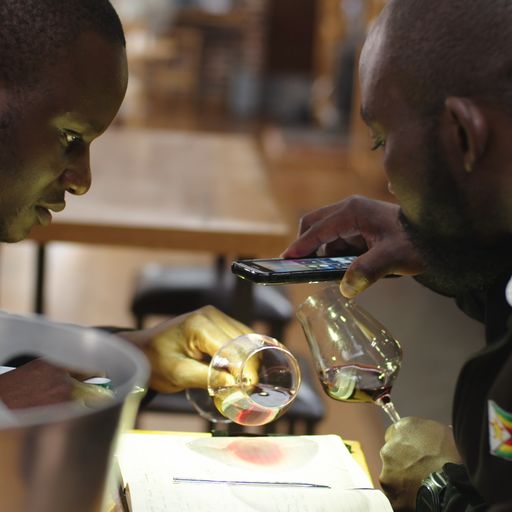
- Film
Docs: Unique Underdog Tale “Blind Ambition” Throws Spotlight on Joyfulness of Refugee Experience
Nonfiction cinema does many things well. It can generate empathy by dropping audiences into circumstances vastly different from their own. Or it can take viewers to a place of comfortable familiarity, and show them common ground with people previously considered “the other.”
Sometimes, at least in the sociopolitical realm, nonfiction cinema struggles with one element: its color palette doesn’t always reflect the full emotional spectrum of real life. As it pertains to the refugee experience, the vast majority of works adopt a down-tempo solemnity – as if a tone of unbending seriousness is the only way to reach and teach people.
Blind Ambition, telling the incredible true story of an underdog quartet of Zimbabwean refugees who compete under their national flag at the World Wine Tasting Championships, is a refreshing exception to this axiom.
Threading a needle between difficulty and hopefulness, it honors the melancholic and at times brutal pasts of its subjects, and their respective escapes from Robert Mugabe’s repressive regime. But it also plugs into the unadulterated joyful embrace of their unexpected and inspiring new lives.
The rejuvenating result, releasing to both theaters and on VOD via Samuel Goldwyn Films on September 2, is a uniquely uplifting movie that seems tailor-made for eventual adaptation into a narrative feature.
Co-directed by Rob Coe and Warwick Ross, Blind Ambition tells the stories of Joseph Dhafana, Marlvin Gwese, Tinashe Nyamudoka, and Pardon Taguzu — four men from Zimbabwe with no prior connection who end up meeting in South Africa. Hustling and trying to provide better lives for their families, they meet each other after securing jobs in the service industry. Eventually, they become sommeliers at different restaurants and hotels.
Encouraged by wine expert and restauranteur Jean Vincent Ridon to refine their skills, the group sets their sights on the World Wine Tasting Championships, hosted annually by the Hotel Château de Gilly. After launching an online fundraiser to cobble together $7,600 to underwrite their trip to Burgundy, France, they secure a slot in the Olympic Games of the wine world — a tough competition in which teams from two dozen countries attempt, using a point system, to blind identify the grape variety, country, region, producer and vintage of 12 bottles of wine, six red and six white.
After a period of mentorship, Ridon, serving as South Africa’s coach, cannot ethically simultaneously guide the Zimbabwe team. So, he recommends Denis Garret, a colorful Frenchman who is deaf in one ear (and mysteriously on the outs in the broader oenological community) and provides the movie with a vivid supporting character.
It’s a credit to Coe, Ross, and editor Paul Murphy that Blind Ambition doesn’t become just about its subjects’ gate-crashing. The film builds naturally to the competition portion of its narrative. When it arrives there, it’s shot through with an entertaining, multilayered tension.
It’s also quite interesting, in a world where currently so much chest-thumping selfishness is conflated with patriotism, to hear about this group’s sincere pride in their country despite several grievous wrongs done to them and their loved ones.
Unsurprisingly, a good bit of Blind Ambition’s most emotional moments are rooted in the personal stories of its subjects. Pardon, whose father died when he was five, talks about the struggle and guilt associated with leaving his mother, who passed away shortly after his move. Ever-friendly Joseph, who left behind a two-year-old son when he emigrated to South Africa, puts on a brave face but pauses and swallows hard when he says “Our journey is, actually, tattooed in our brains and hearts.”
Finally, considerably to its credit, Ross and Coe’s film also doesn’t shy away from the realities of the racial and economic homogeneity of its backdrop: the upper echelon of the world of wine is not only somewhat insular but also incredibly Caucasian. Veteran British wine critic Jancis Robinson — one of a couple of interviewees who cops to this fact — talks about rediscovering her passion for wine through the Zimbabwean team. Her hope is that their participation will secure a beachhead from which greater diversity and inclusion can be propagated.
In this regard, Blind Ambition serves as a beautiful example for would-be nonfiction filmmakers. It’s a well-crafted, unabashed crowd-pleaser that touches upon serious subjects. It’s a movie with adjacent life lessons artfully interwoven but that never overburdens the robust humanity of its participants.

